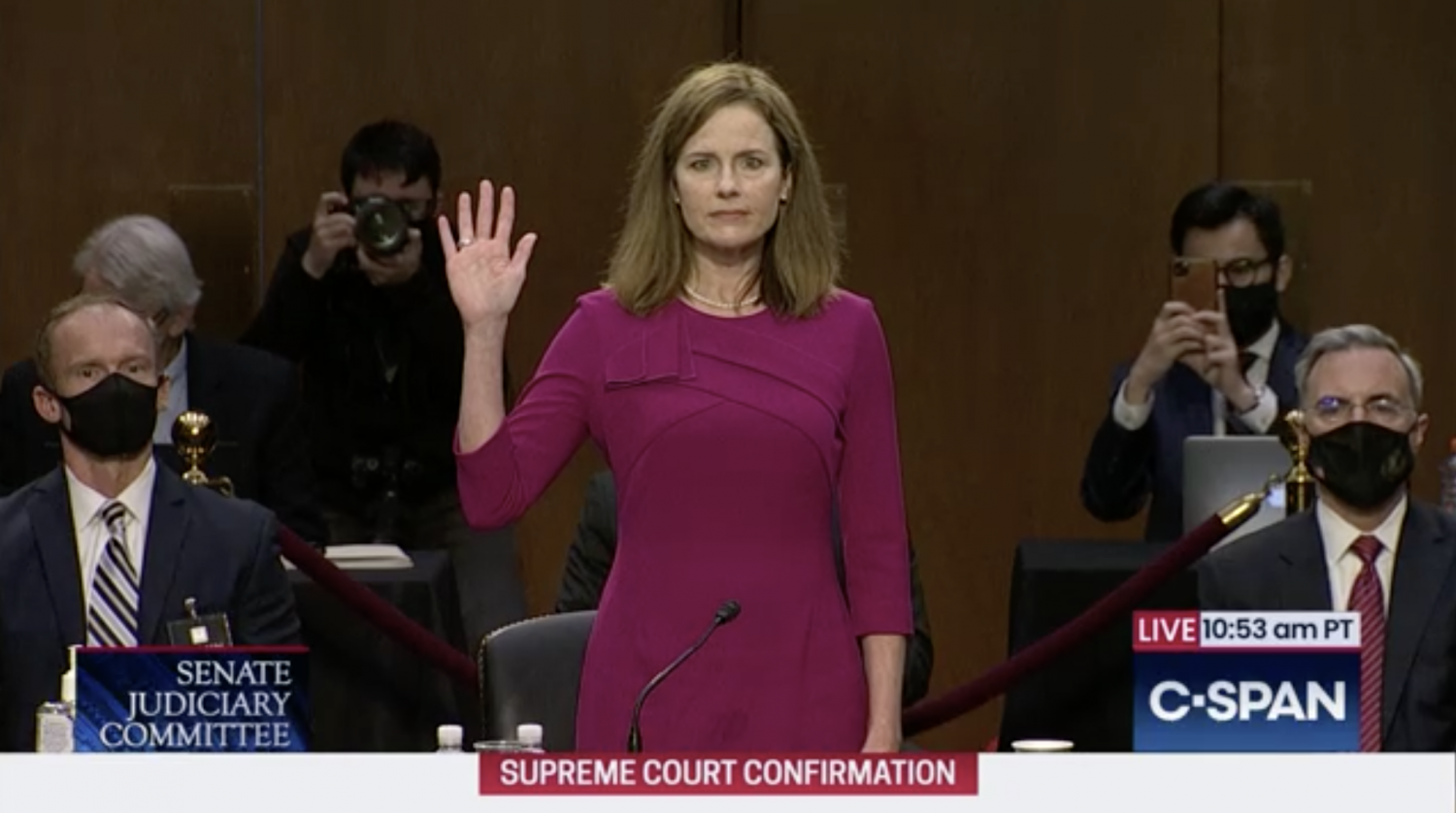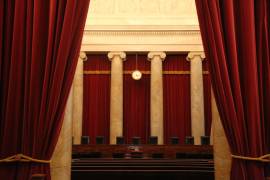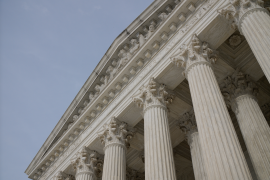On Monday, October 12, at 9 am Eastern, the Senate Judiciary Committee began confirmation hearings for Judge Amy Coney Barrett to the United States Supreme Court.
It is impossible to overstate how consequential a Justice Coney Barrett would be to the rights of LGBTQ people and everyone living with HIV.
Lambda Legal has done a deep dive into her record with respect to the issues that affect our communities the most and put the following guide together explaining exactly what is at stake.
Marriage Equality
Judge Barrett’s approach to questions of constitutionally protected personal liberty is not only inconsistent with, but would seek to roll back, landmark decisions that have been essential to the ability of LGBTQ people to live authentically, to protect their families, and to make deeply personal decisions without fear of government interference. In 2016, then-Professor Barrett gave a presentation in which she expressed that marriage should not be viewed as a fundamental right for same-sex couples and instead should be decided on a state-by-state basis. This approach mistakenly erases the duty of courts to enforce everyone’s constitutional rights. If followed, it would deny equal liberty, dignity and autonomy to LGBTQ people, women, racial minorities and any other marginalized community historically denied those rights.
Just last week, Justices Clarence Thomas and Samuel Alito authored a troubling statement in a case involving Kim Davis, the clerk in Kentucky who sought a special exception for issuing marriage licenses to same-sex couples. In their statement, they took issue with the majority opinion in Obergefell v. Hodges, the case that made marriage equality the law of the land, saying that individual states should have been able to “resolve this question through legislation” and claimed the Court wrongfully “bypassed that democratic process.” It is clear that if confirmed, Justice Barrett would be in good company.
In 2015, Coney Barrett signed onto a letter that said that she supports “marriage and family founded on the indissoluble commitment of a man and a woman.”
Transgender Rights
In a lecture discussing issues that could soon come before the Supreme Court, then-Professor Barrett expressed the legally unsound and troubling view that transgender people are not protected by Title IX’s federal prohibitions against sex discrimination in the context of education programs.
Judge Barrett’s approach has been soundly rejected by jurists spanning the political spectrum, perhaps most authoritatively twenty years ago by her mentor, Justice Scalia, for a unanimous Supreme Court, and most recently reaffirmed by Justice Gorsuch for a six-member majority in Bostock v. Clayton County, which extended federal protections against sex discrimination to LGBTQ employees.
Equally, if not more disturbing, is how Judge Barrett has characterized transgender people. For example, she has opined that “[p]eople will feel passionately on either side about whether physiological males who identify as females should be permitted in bathrooms especially where there are young girls present.” (emphasis added). This misgendering of transgender people, particularly of transgender youth, callously disregards the legitimacy of their identity. Furthermore, this rhetoric invokes defamatory falsehoods suggesting not only that transgender girls are not truly girls, but that they somehow pose a threat to cisgender girls.
Judge Barrett’s ardent but misguided views about transgender people deserve particular scrutiny due to the number of issues likely to come before the Supreme Court soon, including Title IX’s protections for transgender students, the Trump administration’s ban on military service by transgender people, and numerous rule changes adversely affecting the ability of transgender people to work, stay in school, receive medically necessary care, and fully participate in public life.
Health Care
Despite the Affordable Care Act’s success in making coverage available for millions and although our country is suffering through the worst health crisis in a century, the U.S. Supreme Court will hear oral arguments about the constitutionality of the ACA just one week after the election.
LGBTQ people and people living with HIV are more than twice as likely to be uninsured as the general population. Also, the judicial repeal of the ACA would unwind the progress made in significantly decreasing uninsured and underinsured rates for people living with HIV following the passage of the ACA.
It is beyond question that Judge Barrett’s supporters, including President Trump, know they can count on her to remain consistent in her academically fringe view that the ACA is unconstitutional. Given her public positions and the partisan nature of the debates about the law’s fate, any claims to believe she would have an open mind if elevated cannot be credited.
In 2017, then-Professor Barrett wrote that Justice Roberts “pushed the Affordable Care Act beyond its plausible meaning to save the statute” in NFIB v. Sebelius (SCOTUS case upholding the individual mandate a tax valid under the Taxing power).
Access to health care is an issue of profound importance to LGBTQ people and people living with HIV. The Affordable Care Act (ACA) has expanded health care coverage for over 20 million people and has saved and improved untold numbers of lives. In addition, over 130 million people in the U.S. (including millions of Coronavirus survivors) suffer from preexisting conditions.
Reproductive Rights
In 2006, Judge Barrett signed onto a full-page newspaper ad demanding an end to legal abortion. Following a pattern set by many Trump administration nominees, Judge Barrett then failed to disclose this information on her Senate Judiciary Committee questionnaire.
Notably, Professor Barrett also has expressed her hostility towards contraceptive insurance by joining a letter in 2012, referring to the ACA’s birth control insurance coverage as “Unacceptable.” Her position reflects not only her personal view that human life should be protected from the moment an egg is fertilized, a view far outside the mainstream, but also that our legal system should support that view despite the equally sincere religious and moral beliefs of those who disagree and whose lives would be directly affected. If views about reproductive health care were to become the law of the land, many thousands of couples – LGBTQ and not – who have depended on infertility medicine to become parents would not be able to start families.
Racial Equity
We are also deeply troubled by Judge Barrett’s apparent lack of commitment to racial equity. In one especially troubling case, Judge Barrett denied rehearing of a decision in favor of a company that had segregated its employees by race. She took this position despite the explanation given by the dissent that the policy had violated the core teaching of Brown v. Board of Education, that “separate is inherently unequal, because deliberate racial segregation by its very nature has an adverse effect on the people subjected to it.” Judge Barrett’s complicit acceptance of racial segregation in a contemporary workplace is deeply disturbing and demonstrates a profound misunderstanding or minimization both of the harms of such a policy and the overriding responsibility of federal judges to enforce the statutory and constitutional bans on such racialized abuses of power.
Affiliation with Anti-LGBTQ Organization
Judge Barret has also given lectures for a law student training program sponsored by the Alliance Defending Freedom (ADF), an organization dedicated, among other goals, to recriminalizing same-sex relationships, to preventing marriage equality, and now to expanding religious rights to refuse services to same-sex couples, both married and unmarried, and to exclude transgender people from public life.
ADF’s overseas advocacy defends harsh criminal penalties for same-sex intimacy and supports forced sterilization of transgender people. In the United States, ADF is among the largest, best known, and most extreme of the many anti-LGBT legal organizations. Judge Barrett’s decision to affiliate herself with this organization demonstrates a marked lack of respect and concern for the countless LGBTQ people who are denied services, shunned, and otherwise harmed due to the advocacy of organizations like ADF. It is impossible to believe that she would be able to administer fair and impartial justice to members of a group she has so disdained.





